BIZARRE LOVE TRIANGLE
Richard Glatzer and Wash West’s The Fluffer is a comedy about obsession set in the world of the gay-porn industry. Steve Gallagher talks with the directors
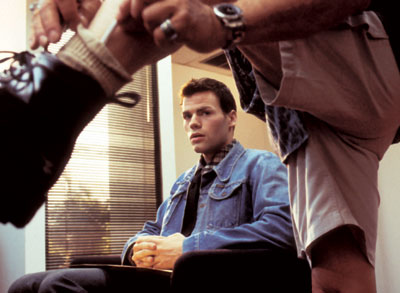 |
| Photo: Piers Hanmer |
The Fluffer, co-directed by Richard Glatzer and Wash West, is an affectionate spoof of the sex industry – an industry Wash West knows all too well, having taken the gay-porn world by storm since arriving in Los Angeles five years ago. West’s Naked Highway, a brilliantly realized road movie, swept the 1998 GV Guide and Adult Video News awards shows, raising the bar in an industry that previously demonstrated little concern for character development or craft – catering, instead, to the VCR’s fast-forward-search button.
Partnering with Richard Glatzer – an experienced producer of reality TV shows, whose prior independent feature, Grief, remains a cult hit since its release in 1993 – West and Glatzer have fashioned a serio-pop confection in The Fluffer, a film whose superficial gloss on the "adult entertainment" industry belies a trenchant critique of the cult of celebrity.
For Glatzer and West, "fluffing" is not merely the act of stimulating an actor prior to his performance in a porn film, it is also a metaphor for the power dynamic in any relationship that is one-sided. And they are quick to cite numerous examples from film history – such as Letter from an Unknown Woman, Rebel without a Cause and Midnight Cowboy – to bolster their case.
While the filmmakers set out to make a film "driven by ideas and themes," as West says, they were equally determined to fashion a film entertaining enough to be accessible to a wider audience. The Fluffer – originally conceived as a modern-day retelling of the Narcissus and Echo story – succeeds on both counts.
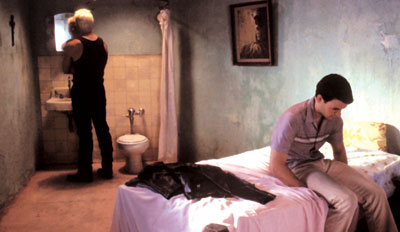 |
| Scott Gurney And Michael Cunio. |
When Sean McGinnis (Michael Cunio) rents a copy of Citizen Kane at his local video store, he discovers the box contains the wrong cassette. The copy of Citizen Cum he pops into his tape deck turns out to be a gay-porn film, and Sean is immediately transfixed by its beefy star, Johnny Rebel (Scott Gurney).
Sean’s initial fascination quickly turns to obsession as he is drawn deeper into the world of porn, eventually securing a job as a camera operator at Men of Janus, the company that produces Rebel’s films. He soon finds himself cast in the role of a "fluffer" servicing Johnny Rebel. But Rebel is a straight actor – he’s only "gay for pay" – whose own monumental self-absorbtion leads inevitably to tragedy.
The Fluffer will be released this fall by First Run Features.
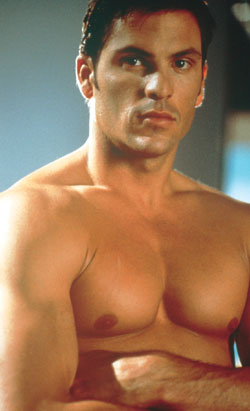 |
| Scott Gurney. |
WASH WEST: It started about six years ago. I was living in New Orleans, and one day in a second-hand bookshop I found a copy of Linda Lovelace’s autobiography, Ordeal, which is a very good read. In the chapter telling about her experiences on the set of Deep Throat I first saw the word "fluffer." I was surprised to find out what a fluffer did; I just thought it was a ludicrous job description, really. The thought kept going around in my mind: What would happen if a fluffer fell in love with a porn star? It would be very one-sided. I thought, well that‘s a great metaphor for human relationships.
I went around for about six years afterwards saying, "I’m going to make a film called The Fluffer." But all I had was a title. I was very fortunate, though, to meet Richard in L.A., and then I went to work in the sex industry – so I could write a screenplay that had some feeling of reality to it.
FILMMAKER: In what respect is the fluffer a metaphor for human relations?
WEST: It’s a metaphor for the inequality in human relationships.
RICHARD GLATZER: To me, it’s the ultimate obsessive relationship. The film put it in a very unusual context that made it really interesting.
FILMMAKER: At the time you conceived it, was it specific to a gay relationship?
WEST: No. It came from a heterosexual idea in Linda Lovelace’s book, and it was really about the power dynamic in any relationship.
GLATZER: We were inspired by movies like Letter from an Unknown Woman, Midnight Cowboy, and Rebel without a Cause, where you have a kind of –
WEST: – identifiable fluffer character.
GLATZER: Right. There’s a star whose ego needs support and someone who worships them.
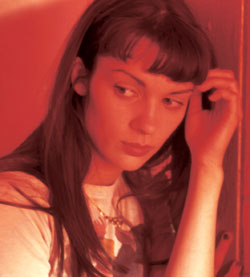 |
| Roxanne Day. |
WEST: And in all of those films the fluffer dies in the end! Joan Fontaine’s obsession with Louis Jordan in Letter from an Unknown Woman was so perfect because she has very limited access to him – she falls in love with him on the eve of his departure. We thought fluffing was a great way of showing [a character’s] very limited access to someone he is in love with.
For someone to go into the sex industry with the intention, as the fluffer does in our film, of finding true love –
GLATZER: It’s a huge incongruity, I think – someone who can sustain a romantic ideal in the context of a flesh-market approach to sex.
WEST: One thing I learned when I came to Hollywood – I not only learned about the porn industry, but I saw a lot of fluffing going on within the mechanisms Hollywood uses to promote stars. A lot of stars will roll in first thing in the morning feeling dreadful, and the hair and make-up people will make them feel wonderful about themselves.
FILMMAKER: The film is about a gay character’s identification with a porno star, and in this case a straight star who is "gay for pay". But the porno star in the film also has a stripper girlfriend who is just as distant from him in their relationship.
WEST: She’s a fluffer too. We wanted to bust open the idea of what a gay movie is and make a movie about sexuality – and also have a very strong female character who’s not portrayed as a fag hag or a best friend but who is a very sexual woman in her own right.
Initially, you see the fluffer and the girlfriend competing for the porn star but, throughout the movie you realize that they have a lot of issues in common – they have the same trouble with this inaccessible man. If you look at the two characters – Sean, the fluffer, and Babylon, the stripper – it’s almost like Fluffing 101 and Fluffing 201. She’s in the position that the fluffer wants to be in, she’s in a real relationship with Johnny Rebel: It’s very sexual, and she can match him blow for blow in any argument. The tag line of the movie is "Watch what you wish for," and it’s about showing the position the fluffer could be in if he was Johnny Rebel’s boyfriend – the position the girlfriend is already in, which is really no better.
FILMMAKER: There are three characters in the film facing similar dilemmas. But you only show background information about Sean, indicating through the use of flashback that there may be a deep-seated psychological cause for his identification with the porn star. At the end of the film, Johnny Rebel intimates that he, too, may have had a similar traumatic experience in childhood, but you don’t hear anything like this from Babylon.
GLATZER: It’s true that we do hint at a background for Johnny, and we do for Sean, but we don’t for Babylon. At different points in the writing of the script, it felt a little too geometrically balanced. We felt the audience really needed to know that the fluffer was their point of identification – that he was the protagonist. Even though Babylon plays a significant role, there was a danger in different drafts of the script of being too evenhanded about it.
FILMMAKER: One of the interesting things about the film is that, although it might appear to be a condemnation of the porn industry –
WEST: – it’s also valentine!
FILMMAKER: It is also a valentine. There’s that line where the lesbian working at the gay porn company says, "It’s an adult industry and you’ve got to be an adult to work in it," implying that there’s nothing inherently wrong with the porn industry. What brings these characters to the porn industry, or to stripping, and how they cope with it, is what you’re dealing with.
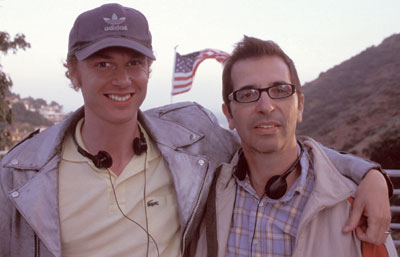 |
| Wash West And Richard Glatzer. |
WEST: As far as the porn industry in general, we wanted to stay free of any kind of moral judgement about it. We just wanted to show how it works – with both its spectacular, glamorous moments and its depths of despair. It’s an industry of extremes. You’re dealing with sex, and you’re dealing with people who are attracted to exhibitionism in front of the camera. There’s a lot of pycho-sexual stuff going on. And people go into porn for different reasons – some people find it a wonderful home, some people find it’s got too many temptations and can be very destructive.
We didn’t want to deny the complexity of an industry like pornography, which is really different from person to person. But we wanted to show that it can be this incredible thing too. I think the party sequence, in which the whole porn industry is gathered together, is one of the ways that we show that. Then, of course, you can look at Johnny Rebel and say, "Well, too much of a good thing is, in fact, a bad thing."
People from the sex industry who have seen the film love it. They know exactly what’s going on here. When one character says, "It’s an adult industry, you’ve got to be an adult to deal with it" – the people in the sex industry are like, "Yes. That’s it!"
FILMMAKER: Wash, how accurate is the film’s depiction of the porn industry, and do you plan to continue working in it?
WEST: A lot of the dialogue in The Fluffer is taken from things people really said, but there is a certain stylization of the porn industry in the film. To actually convey what it’s really like on a porn set, you’d need a lot more time in the film to go into it, because it’s a lot to do with waiting around. It would be like [Chantal Akerman’s film] Jeanne Dielman – like watching a kettle boil! So, there is a compression of events in the film.
As far as how it’s affected my view of the porn industry, I’m still very proud of myself as a sex-industry worker and as a pornographer, and would like to continue that role as well as, you know, making mainstream movies. It was a bit tough, though, going back to a porn set after The Fluffer and not having a crew anymore. The way I do porn, I usually have just one p.a. and a photographer – it’s back to guerrilla filmmaking.
FILMMAKER: In addition to the films you already mentioned, there were many other visual references to films within the film. Such as The Graduate –
GLATZER: – the power dynamic again.
FILMMAKER: And the scene in which Johnny bleaches his hair, for instance, is right out of Warhol’s My Hustler.
WEST: Exactly. Warhol’s films were the ultimate porn-art cinema crossover. Using the camera as an instrument of obsession and having a beautiful man gaze at his reflection in the mirror was very in tune with what we were doing. We were also into the Michael Powell film, Peeping Tom – using the camera as much as possible in a sexual way. But also, looking at the imprint in Peeping Tom, you begin to understand why the guy’s running around murdering people.
Similarly, through the use of flashbacks in The Fluffer, we wanted to show that there was an experience in the early adolescence of the lead character that wasn’t so much a classic case of abuse but rather a complex unfinished sexual encounter that left him feeling guilty. He couldn’t talk about it, because the person with whom he’d had this experience was completely inaccessible afterwards – because he was a married man who lived across the street.
For a gay person, coming out of the closet is one thing, it’s one stage of declaring your identity, but then you might find there are other things you need to go back and look at in order to move on. The film’s kind of about the act of coming out as a series of continuing revolutions –
GLATZER: – or revelations.
WEST: – rather than one defining moment.
GLATZER: Even in his flashbacks, you see that Sean is already obsessed with the camera, already obsessed with spying on the neighbor across the street. At the end of the movie, what’s triumphant for me, and for the character, is that he sees a pattern to his behavior and can hopefully change it.
WEST: I think it’s a touchstone for many gay movies right now to look at early sexuality. You have Chuck & Buck, L.I.E. and Jerry Podeswa’s new movie, Touch, which is very much about childhood experiences – and The Fluffer is too. It affects everyone, gay or straight. But with gays, you have the added pressure cooker that your sexuality is often repressed by society; you have very little access to support for any early experiences that you may not have worked out.
FILMMAKER: There’s a scene in the film in a bar where Sean is approached by an older gay man who buys him a drink and begins reminiscing about the good old days. They end up both lamenting having "come out" and make a toast "to the closet."
GLATZER: Right.
FILMMAKER: That scene reminded me of an essay by Bruce LaBruce and Glenn Belverio called "A Case for the Closet." Their essay was all about how gay identity was formed in the closet, and how coming out and becoming assimilated within mainstream culture – becoming normalized, so to speak – is a step backward for gay identity. The essay called for gays to go back into the closet!
WEST: I feel that way every time I see The Celluloid Closet. I think, hmm, maybe the films were better when gays were in the closet.
GLATZER: There was a such great depth to gay culture for a long time, up to the early ’90s with ACT UP, when I still felt a great sense of identification.
WEST: It used to be a network to support individuals, whereas now it’s more conformist.
GLATZER: I feel like we’ve just become one big consumer culture. It isn’t about individualism, it’s just about some big bland homogeneous center. In The Fluffer, the fact that Sean is so willing to toast the closet is not just another sign of his maladjustment. It’s a double-edged thing in the film. I certainly share Bruce and Glenn’s feeling that something’s been lost.
WEST: One usually sees the time he’s in the closet as some dark and evil period. Even though they were repressed experiences, it doesn’t diminish their significance.
GLATZER: You hear about filmmakers like Martin Scorsese, with his asthma, being ill and not being able to go out and play ball with the other boys in the neighborhood. But it was a time, for him, of reflection and learning about films, and gaining depth to his character. In a sense, the closet can be the same thing for gay people, it’s –
WEST: – it’s like asthma!
FILMMAKER: What is it about Sean’s character that allows him to work through his obsession with Johnny Rebel in the end?
WEST: I think Sean’s not shut down to his feminine side. He’s a very caring and deep-thinking guy – and he has the honesty and bravery to confront Johnny Rebel with his early experiences. Through this, he sees Johnny fall off the pedestal.
GLATZER: It is about the limits of so-called masculinity as well, because Johnny’s inability to reflect on his experience is what ultimately dooms him.
FILMMAKER: Is there a significance to the fact that Sean and Johnny’s showdown occurs in Mexico?
WEST: Well it was kind of little bit of a noir trope, escaping across the border into Mexico. We tried to make it signify a place that was more open sexually.
GLATZER: Although we also have Johnny Rebel say, "It looks like America, only worse." For me, it’s a place tinged with romanticism, it’s a more bucolic place. When Sean takes off with Johnny across the border, lord knows what he thinks is going to transpire between them, but it does turn out to be a healing place in ways that he doesn’t anticipate.
FILMMAKER: Can you talk about the look of the film? Was there a conscious decision to reach a particular audience?
WEST: Within the movie, we’re dealing with different levels of reality. When we show things being filmed on the porno set, we switch [from 35mm] to digital video, to give it the effect of a porno reality. Whereas we tried to give the fluffer’s environment a very contructed feeling – because he’s living in his own world. Every camera shot was locked down or a dolly shot, and all his scenes are on sets rather than real locations.
With Babylon, we wanted it to feel like she’s dealing with the reality of who Johnny Rebel is, as opposed to the fantasy. So we filmed all her scenes in real locations, and every shot is handheld to give them a more raw feeling.
Then, when Sean has his revelation in Mexico, it also switches to a handheld camera, placing him in the same position as her, because he now has a clearer view of the world and is able to deal with things.
And the flashbacks are shot in black-and-white to evoke the feeling of a memory.
GLATZER: We just wanted a movie that looks beautiful. We talked about doing the movie on film versus video – that sort of thing – and we felt that, because the subject matter could be perceived as edgy and possibly inaccessible, we wanted to fight that. We didn’t want a film that was a midnight movie. We wanted a movie that could be released more widely. And a movie that had an elegance to it that people wouldn’t expect given the subject matter.
In terms of the commercial versus the art-film aspects of it, I think both Wash and I love all sorts of movies. We certainly relish Antonioni’s movies, but I think we both admire Hitchcock maybe more than anybody else for being able to make films that are popular entertainment and yet have all this depth. That’s our ideal – not to make art films for an elite few, but to make films that are worth exploring if you’re so inclined, but that can be consumed on a pop-culture level as well.
WEST: We wanted to make an accessible art film. It’s a film that’s really driven by ideas and themes that can stimulate an audience, as an art film should. But not with the longeurs and drawn-out things that a lot of art movies do. We wanted to make something entertaining enough to be accessible to a wider audience.
FILMMAKER: Are you finding that to be the case?
WEST: My stepdad, who’s a construction worker, loved the movie; his only complaint is that the stripper’s tits aren’t big enough! Whereas other people are writing Ph.D.’s about how Sean is going down to San Ignacio at the end of the film — and how that saint in Catholicism represents values which the fluffer is aspiring to. We’ve had every reaction.
FILMMAKER: There are scenes in the film reminiscent of Paris, Texas — having characters closed off from each other by one-way mirrors — and also Todd Haynes’s Safe, at least thematically, in terms of the way it portrays a character increasingly closed off from the culture in which she lives. Julianne Moore’s defining moment in Safe, for instance, is when when she looks in the mirror at the end of the film and says, “I love you,” raising questions as to whether the film is not only about real or imagined disease, but also about self-love and self-hatred.
WEST: It’s interesting, that reflection thing at the end of Safe — because we really played with the reflection of the fluffer a lot. There are a lot of mirrors in the movie. We initially pitched the film as a modern-day Narcissus and Echo story. Narcissus was the very first Johnny Rebel and Echo was the first fluffer… repeating and supporting his image. Throughout the film you see Johnny Rebel’s reflection a lot, and it’s all about his image separate from him. Sean, the fluffer, is in front of mirrors a lot of times in the movie but you never see his reflection. It’s almost like he has no self-image, so he buys into Johnny Rebel’s image. In the Mexican motel room, when the fluffer has his big let down at the end, and an awakening as to what his reality is, he actually sees his reflection for the first time, and it’s in this strange old mottled mirror — and he almost doesn’t recognize himself!
FILMMAKER: It’s also the first time he uses Johnny Rebel’s real name.
WEST: Yeah, he says, “Mikey.” We used names a lot because people in porn all take on invented names to create a persona that’s different from their normal personality.
GLATZER: And it is true, when you talk to porn stars, if everyone’s calling them by their porn name and you know their real name and use it, you feel like you’ve done something very intimate.
WEST: You’ve definitely crossed a line. Everyone in the film is alternately referring to Johnny Rebel and to Mikey, but Sean never uses Mikey until the end of the film. It’s all about revelation and true identity.
GLATZER: And also seeing someone as an equal, rather than as an icon.
WEST: The other film you mentioned — Paris, Texas: When [Harry Dean Stanton] finds Nastassja Kinski at the end of the film, there’s a sheet of glass between them which she can’t see out of. That’s very interesting, because in porn you have a sheet of glass, which is your TV screen. You’ve got these objects of desire, and you’ve got something preventing you from accessing them. The fluffer is someone who, in a way, breaks through that glass screen. He gets to be on the porn set and he gets to have a physical relationship with the object of his desire, which many people only fantasize about. But there’s still a [metaphoric] glass screen between them.
When Sean has the dream about Johnny Rebel in the film, he’s on one side of a mirror — in a very similar way to Harry Dean Stanton in Paris, Texas — and he can see Johnny Rebel but Johnny can’t see him. When they kiss through the glass, Johnny’s kissing his own reflection — which is that Narcissus thing again — and Sean, trying to kiss Johnny on the other side, is only feeling the cold surface of the glass.
FILMMAKER: How did you cast the film?
GLATZER: We started casting when we had no money — just to get the ball rolling. And we were up against the goliath of the big agencies here in L.A. who would have nothing to do with a film of this budget, and certainly not with a film called The Fluffer. But Liz Jereski, who did the casting, was really resourceful, getting the smaller agencies to take it seriously. And we just started reading a lot of people who came in off the street. Our three stars had had very limited experience in feature films. Scott Gurney, who plays Johnny Rebel had done Baywatch and was a recurring guest star on 90210. Roxanne Day and Michael Cunio had done some student films and some theater, but that was about it. Deborah Harry really surprised us. Her managers just got her the script — it was Liz’s idea to send it to her managers, and we thought, “Oh they’ll never give it to her.” It probably went out on Monday and by Thursday we heard that Debbie had read the script and loved it. I think Debbie told her managers she specifically wanted to do edgy independent films, and when a script called The Fluffer came through, she was like, “Let me see that!” Whereas, for most people, that would have been a black mark — a movie with that title — for her it was something that got her attention immediately.
WEST: We then had a long time to work with the actors while the money was being raised. We’d get together and watch movies that influenced the script, everything from Law of Desire to Rebel without a Cause to Peeping Tom to Marlon Brando in The Fugitive Kind, and it was great. It was a really relaxing time where we could explore ideas about the film and ideas about the characters.
FILMMAKER: Where did the money to shoot the film come from?
GLATZER: Our producer, John Sylla, first gave us a big financial vote of confidence and came on board. He gave us enough to start shooting. We didn’t really have enough money to finish the shoot — we thought we did — and as we were going forward, we realized the money was being spent a lot faster than we thought it would. Then we really had a miracle happen: this guy Gill Sperlein, who was working as the set decorator, approached us on the same day that our producer informed us we were really in trouble and might have to close down the set — this was in the third week of a five-week shoot — and Gill came up to us out of the blue and said, “Hey, I think this film is really going to be something, and my boyfriend and I would like to invest some money.” We thought, $5,000 would really help right now. And he said, “Well, we were thinking more like $100,000.”
WEST: It turns out Gill’s boyfriend had just had a huge hand in deciphering the human genome!
FILMMAKER: So it was all private equity?
WEST: Yeah. We first went around Hollywood and everyone was like, “Oh this is an independent film.” But then we pitched it to the independent companies, and their reaction was that it was not commercial enough — it was too risky. It was too queer for Christine Vachon!
GLATZER: We kept hearing, “Can you shoot it on, like, $50,000?” I mean, I made Grief on that kind of money and we had no interest in doing that again. We wanted a movie that had a certain kind of production value, and we weren’t going to make a movie for that amount of money. We felt we’d be underselling ourselves.
WEST: In indie film, also, there has been a move to make things more sanitized and more safe, with more stars in them, and “developing” them so that they are a little more conventional. And, for me, the strength of independent film is that you don’t have to adhere to Hollywood character arcs. The things we look for are the more unexpected and novel ideas. We felt we could make the film we wanted to make by getting the money privately.
FILMMAKER: Was the film made for a gay audience primarily?
GLATZER: We’re hoping the film will cross borders in terms of its audience. I just don’t understand why, at this point in time, sophisticated heterosexual filmgoers can’t identify with gay characters the same way gay people have identified with heterosexual characters for years. People’s reactions to the film don’t seem to be determined by their orientation. Some straight people love it, a few gay people don’t. It’s being released by First Run Features and TLA video, and they want it to reach out past the gay dollar.
VOD CALENDAR


 See the VOD Calendar →
See the VOD Calendar →


